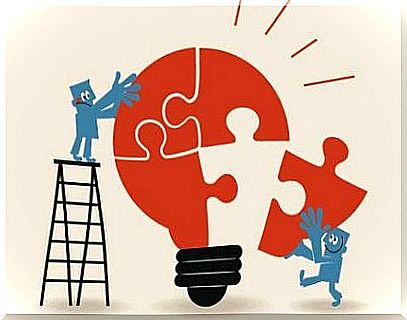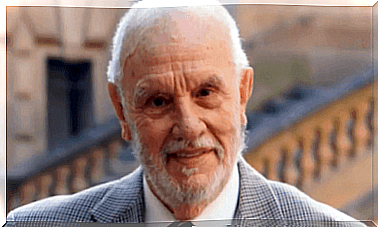Do You Know Our 8 Basic Psychological Processes?

Our behavior is a resource that we have and that allows us to adapt to the world. This enables us to modify our environment as well as our reality in order to be able to adapt to what is happening. We know that these behaviors are governed by internal mental processes. But what are these mental processes? It is from this question that we can present to you our 8 basic psychological processes.
The 8 basic psychological processes are: (a) perception, (b) learning, (c) language, (d) thinking, (e) attention, (f) memory, (g) motivation and (h) emotion. In this article we will discuss these processes individually, but keep in mind that they are closely related to each other. Although they retain their terminological independence, many of these processes could not exist without the presence of others. Thus, it is better to understand these distinctions as an artificial classification that facilitates our scientific work.
Perception
Within basic psychological processes, perception is responsible for allowing us to have an “image” of the reality around us. In fact, it brings us the information of external stimuli through the senses.
Perception is responsible for organizing and making sense of any sensory stimulus. The function of this process is obvious: knowing the environment allows us to move around and interact with it; basic aspects in order to know an efficient adaptation.
Learning
Here we have the process by which we modify and acquire knowledge, skills, competences, behaviors, etc. It works through what happened in the past, we learn to relate behavior to consequences. This is why learning is very much linked to memory.

The study of learning is mainly carried out by the psychological branch of behavioralism, which was the origin of the theories of classical and operant conditioning; theories that explain the mechanisms that allow us to learn.
This process is useful as it allows us to vary our driving repertoire depending on what has happened in the past. It is something that allows us to respond appropriately to present and future situations.
Language
Human beings are social beings, therefore language is the process that gives us the ability to communicate with others. This communication, in the case of humans, takes place through a complex symbolic code, language. The complexity of our language allows us to accurately discover almost anything, whether in the past, present or future.
The usefulness of this process is related to our need to maintain complex social relationships that allow us to survive in a hostile environment. Language allows us a mode of communication broad enough to maintain human societies.
Thought
We are now evoking a very complex process which is defined in psychology as the task of transforming information in order to organize it and give it meaning. The study of thought began through Aristotelian logic; but his analysis was not effective because the human being does not reason by logic.
The function of thought continues to be a controversial topic today. This situation is partly due to the terminological confusion that exists around this word. Despite this, the most accepted idea is that its objective is to act as a control mechanism in the face of the situations we are confronted with.

Attention
Attention is the process of focusing our resources on one set of stimuli and ignoring the rest. This is because we are receiving a large amount of stimulus at a time and we are unable to pay attention to them comprehensively.
The attentional process is adaptive since if it did not exist, we would find ourselves lost without knowing what stimulus we should react to. The fact that the self-imposition of a cognitive limitation supposes an evolutionary adaptation is paradoxical, but it is so.
Memory
The basic psychological process of memory allows us to codify information in order to store it and then be able to retrieve it. We are faced with an essential process closely linked to all the other processes.
Memory allows us to retain explicit information such as the name of the capital of France or procedural information such as knowing how to ride a bicycle. Memory exists because it is really useful to have information on our years lived in order to be able to reason on the way to act in future events. In addition, without this skill, the other basic psychological processes would not exist since they are all very dependent on memory.
Motivation
Among the basic psychological processes, motivation is responsible for providing the body with the necessary resources to act. It is the process responsible for activating the body and bringing it into an ideal state. Another important aspect of motivation is its direction; it does not only allow you to prepare the body, it is responsible for directing driving among the various possible options.
The function of motivation is to get the individual to direct behavior to his goals, and to prevent him from standing still and doing nothing. It is a process very much linked to emotion and learning.

Emotion
Emotions are reactions to external stimuli, which allow us to guide our behavior and act quickly in response to the demands of our environment. Emotions have a threefold behavior: (a) somatic, physiological changes would provoke emotion, (b) behavioral, the spectrum of behavior would be triggered by emotion, and (c) sentimental, this would be the subjective experience of the person. emotion of the individual.
The function of emotion is to manage our behavior quickly and effectively. The majority of decisions lack the necessary importance in order to dedicate high time and resources to them, and this is where the emotion acts. It is important to understand that any decision is mediated by our emotions to a greater or lesser level.
In this article we have presented the basic processes in a very superficial way, they are all large subjects of study and have multiple details. Intensive study of each of these details provides us with basic information enabling us to understand human behavior and mental processes.










